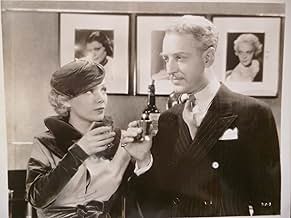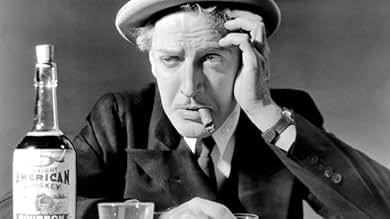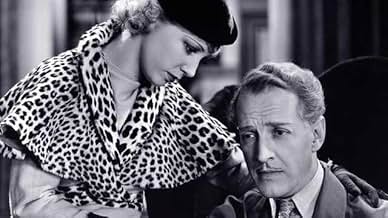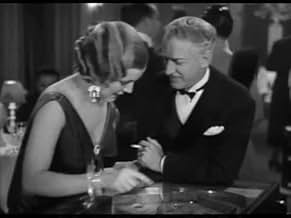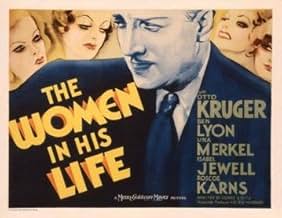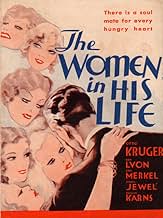AVALIAÇÃO DA IMDb
6,3/10
271
SUA AVALIAÇÃO
Adicionar um enredo no seu idiomaA brilliant, successful criminal defense attorney's life is turned upside down when he takes on a case of a murdered woman who turns out to be an old flame who left him 10 years ago.A brilliant, successful criminal defense attorney's life is turned upside down when he takes on a case of a murdered woman who turns out to be an old flame who left him 10 years ago.A brilliant, successful criminal defense attorney's life is turned upside down when he takes on a case of a murdered woman who turns out to be an old flame who left him 10 years ago.
- Direção
- Roteirista
- Artistas
Don Brodie
- Reporter
- (não creditado)
Claire Du Brey
- Mrs. North
- (não creditado)
George Guhl
- Mr. Willis
- (não creditado)
Robert Homans
- Cop
- (não creditado)
Olaf Hytten
- Page
- (não creditado)
Avaliações em destaque
One of the shining examples of the mastery of screenwriting from the Golden Age of Hollywood, by F. Hugh Herbert (not to be confused with comic actor Hugh Herbert from the same era). Viennese-born Herbert (Sitting Pretty, The Moon is Blue, etc.) was also the President of the Screen Writer's Guild.
In this film we experience the commanding embrace of a well-conceived story brought to resplendent life by the notable actor Otto Kruger and a fine cast. Kruger, a major Broadway star of the 1920s later became a reliable and extraordinary screen character actor.
Today gems like this can be encountered only fleetingly on Turner Classic Movies. Worthy of study, they are not to be found on Home Video, another oversight of movie moguls who often sit on top of forgotten gold mines while churning out garbage that sustains illiteracy and decimates popular values. This is just one of hundreds for which we owe Ted Turner a debt of gratitude.
In this film we experience the commanding embrace of a well-conceived story brought to resplendent life by the notable actor Otto Kruger and a fine cast. Kruger, a major Broadway star of the 1920s later became a reliable and extraordinary screen character actor.
Today gems like this can be encountered only fleetingly on Turner Classic Movies. Worthy of study, they are not to be found on Home Video, another oversight of movie moguls who often sit on top of forgotten gold mines while churning out garbage that sustains illiteracy and decimates popular values. This is just one of hundreds for which we owe Ted Turner a debt of gratitude.
Otto Kruger was an excellent actor and this film was a wonderful opportunity for him to demonstrate his skills. The film begins in Kruger's swank office. He's a rich and successful attorney with very few scruples as well as a rather jaded view of life and women. To sum him up, though successful, he's a self-centered jerk.
Into this office arrives a young woman whose father is up on murder charges. Kruger is too busy and way too egocentric to give the young woman a chance--even when he initially agrees to help her. Again and again, she's left waiting for him to get around to listening to her story. However, when he finally does, he is shocked to hear that the murder victim is actually Kruger's ex-wife who'd left him many years before! It seems that Kruger's idealism and sense of compassion left with her and all the old memories of her came flooding back. To make things worse, he learns that she was a horrid person and realizes what a waste his life has been since she left. Kruger then runs to the cemetery where she was buried--even though it was pouring down rain--and throws himself on the grave. A few days later, he turns up in the hospital suffering from the effects of exposure and nearly dies.
During this little episode, the girl's father's case came up in court and because Kruger wasn't there, the man was easily convicted sine it was passed off to a lawyer who was unprepared. When Kruger FINALLY recovers, he feels horrible for what he'd done and vows to make things right.
While this plot sounds a bit melodramatic (and it was), the acting and action were exceptional and the story very engaging. I really don't want to say more--it may spoil the film, but it's a nice story with a very tense ending. It's well worth a look--especially because of Kruger's terrific performance and range.
Into this office arrives a young woman whose father is up on murder charges. Kruger is too busy and way too egocentric to give the young woman a chance--even when he initially agrees to help her. Again and again, she's left waiting for him to get around to listening to her story. However, when he finally does, he is shocked to hear that the murder victim is actually Kruger's ex-wife who'd left him many years before! It seems that Kruger's idealism and sense of compassion left with her and all the old memories of her came flooding back. To make things worse, he learns that she was a horrid person and realizes what a waste his life has been since she left. Kruger then runs to the cemetery where she was buried--even though it was pouring down rain--and throws himself on the grave. A few days later, he turns up in the hospital suffering from the effects of exposure and nearly dies.
During this little episode, the girl's father's case came up in court and because Kruger wasn't there, the man was easily convicted sine it was passed off to a lawyer who was unprepared. When Kruger FINALLY recovers, he feels horrible for what he'd done and vows to make things right.
While this plot sounds a bit melodramatic (and it was), the acting and action were exceptional and the story very engaging. I really don't want to say more--it may spoil the film, but it's a nice story with a very tense ending. It's well worth a look--especially because of Kruger's terrific performance and range.
Character actor Otto Kruger (48 and looking a decade older, at least by contemporary standards) stars as a rich and successful womanizing criminal defense attorney. His latest affair is with a typical blonde pickup (Isabel Jewell) who claims her love is sincere but Kruger is indifferent and basically thinks of her as little more than a bedroom toy. Kruger is equally blasé about the guilt or innocence of his clients and knows most of them are guilty, including his latest, painted matron Irene Franklin, "the Tiger Woman" as the tabloids call her.
Young Irene Hervey begs for Kruger to take her father, a man falsely accused of murdering his promiscuous wife, as a client but Kruger cannot be bothered, however when he finds Hervey can be of some benefit in Franklin's case he promises to help her. After trying to renege on his word, Kruger is shocked to discover that Hervey's murdered stepmother is in fact is the old flame of his past, the woman he never got over and the root of his hardened heart. Devastated to learn of her death, Kruger goes on a bender that leaves him near death and unable to defend Hervey's father, who is ultimately sentenced to the electric chair. Sobering up, Kruger plots to trap the real killer but will there be enough time to stop the electrocution?
This is a fairly good little melodrama done with typical MGM polish even if it's clearly a minor picture for the studio. Kruger is quite superb for most of the film, utterly unsympathetic in the first half and a sudden, effective change of character later on with splendid work as a drunk with pneumonia. Unfortunately, the last reel is pretty ridiculous (if effectively tense) and smacks more of a lurid poverty row programmer than the classy MGM production it had been up until this point.
Una Merkel is second-billed presumably because she was the only MGM contractee in the film however her role is fairly minor although she does have some classic Una wisecracks and as always is an asset to any film. The movie offers a nice role for character-starlet Isabel Jewell in one of her more sympathetic parts. Ben Lyon, entering the downswing of his career, is good as Kruger's junior partner.
The movie is stolen by Irene Franklin as the plump and painted good-time "Tiger woman" on trial. I've never heard of or seen Franklin before, she apparently was a big vaudeville star in the early decades of the 20th century and here in 1933 looks years younger than her 57 years. She's sensational in her "Mary Boland meets Marjorie Rambeau" type of role and it's incredible that this film didn't launch her into a career as a much in-demand character actress in this era (she went on to many other films but in most of them appear to have played bits). It's regrettable even here her part is rather small as Franklin is most definitely the life in THE WOMEN IN HIS LIFE.
Young Irene Hervey begs for Kruger to take her father, a man falsely accused of murdering his promiscuous wife, as a client but Kruger cannot be bothered, however when he finds Hervey can be of some benefit in Franklin's case he promises to help her. After trying to renege on his word, Kruger is shocked to discover that Hervey's murdered stepmother is in fact is the old flame of his past, the woman he never got over and the root of his hardened heart. Devastated to learn of her death, Kruger goes on a bender that leaves him near death and unable to defend Hervey's father, who is ultimately sentenced to the electric chair. Sobering up, Kruger plots to trap the real killer but will there be enough time to stop the electrocution?
This is a fairly good little melodrama done with typical MGM polish even if it's clearly a minor picture for the studio. Kruger is quite superb for most of the film, utterly unsympathetic in the first half and a sudden, effective change of character later on with splendid work as a drunk with pneumonia. Unfortunately, the last reel is pretty ridiculous (if effectively tense) and smacks more of a lurid poverty row programmer than the classy MGM production it had been up until this point.
Una Merkel is second-billed presumably because she was the only MGM contractee in the film however her role is fairly minor although she does have some classic Una wisecracks and as always is an asset to any film. The movie offers a nice role for character-starlet Isabel Jewell in one of her more sympathetic parts. Ben Lyon, entering the downswing of his career, is good as Kruger's junior partner.
The movie is stolen by Irene Franklin as the plump and painted good-time "Tiger woman" on trial. I've never heard of or seen Franklin before, she apparently was a big vaudeville star in the early decades of the 20th century and here in 1933 looks years younger than her 57 years. She's sensational in her "Mary Boland meets Marjorie Rambeau" type of role and it's incredible that this film didn't launch her into a career as a much in-demand character actress in this era (she went on to many other films but in most of them appear to have played bits). It's regrettable even here her part is rather small as Franklin is most definitely the life in THE WOMEN IN HIS LIFE.
This movie would have been mediocre at best had it not been for Otto Kruger's performance. His acting in this movie is so natural, so unlike most precode acting where the acting is over dramatic. I honestly kept wTching just for him, he totally drew me in.
Kent "Barry" Barringer (Otto Kruger) is a hard cynical lawyer. He gets clients acquitted he knows are guilty using cute "tricks" such as having the defendant's double sit in court being identified by witness after witness only to introduce the real defendant sitting out in the crowd, thus causing reasonable doubt.
Barringer has women betting a night with their bodies over a pinball game. He distrusts even "the women in his life" as cheating chiselers. You see, his wife ran out on him ten years before and something inside him died at the time, so he's spent his time becoming the world's best criminal attorney and "hate bedding" women ever since.
Then one day an innocent appears at his office door - Her father is accused of killing her stepmother. When Barringer sees the dead woman's photo, he realizes that she is the wife who left him ten years ago. He breaks down - as long as there was life there was hope, but now she's dead. She'll never come back. Barringer abandons his practice and his clients and goes on a bender. But what of the girl's father and his trial? Watch and find out.
This is one of my favorite legal precodes. It has everything and its pacing and ability to seamlessly transition from one genre to another is excellent. At first, the film is a courtroom drama, by the end it is a gangster tale. It really has no big stars in it, and Otto Kruger is in rare form in a rare leading role.
Though made by MGM, it really doesn't seem like a film of the era or one that the studio cared very much about, and as a result of MGM's neglect it turned out to be something special. The best way I could describe it is as though MGM and WB had a child. And that child - this film - has the MGM class and WB's sass. I'd highly recommend it.
With Una Merkel as Barringer's unflappable secretary, Ben Lyon as Barringer's straight arrow junior partner, Isabel Jewell as the woman who loves Barringer but might as well be talking to a rock when it comes time to talk of love, and Roscoe Karns as the same kind of wise-cracking assistant he played in 20th Century the following year.
Barringer has women betting a night with their bodies over a pinball game. He distrusts even "the women in his life" as cheating chiselers. You see, his wife ran out on him ten years before and something inside him died at the time, so he's spent his time becoming the world's best criminal attorney and "hate bedding" women ever since.
Then one day an innocent appears at his office door - Her father is accused of killing her stepmother. When Barringer sees the dead woman's photo, he realizes that she is the wife who left him ten years ago. He breaks down - as long as there was life there was hope, but now she's dead. She'll never come back. Barringer abandons his practice and his clients and goes on a bender. But what of the girl's father and his trial? Watch and find out.
This is one of my favorite legal precodes. It has everything and its pacing and ability to seamlessly transition from one genre to another is excellent. At first, the film is a courtroom drama, by the end it is a gangster tale. It really has no big stars in it, and Otto Kruger is in rare form in a rare leading role.
Though made by MGM, it really doesn't seem like a film of the era or one that the studio cared very much about, and as a result of MGM's neglect it turned out to be something special. The best way I could describe it is as though MGM and WB had a child. And that child - this film - has the MGM class and WB's sass. I'd highly recommend it.
With Una Merkel as Barringer's unflappable secretary, Ben Lyon as Barringer's straight arrow junior partner, Isabel Jewell as the woman who loves Barringer but might as well be talking to a rock when it comes time to talk of love, and Roscoe Karns as the same kind of wise-cracking assistant he played in 20th Century the following year.
Você sabia?
- CuriosidadesThe opening scene features Otto Kruger playing a Pinball Machine. This is the earliest known on-screen appearance of a Pinball Machine in a major production. At the time, flippers had not yet been invented and pinball machines were often used for gambling. There was a lot of public debate at the time as to whether pinball was a game of skill or chance, and it was banned in many parts of the country. The movie played on that debate with Kruger making a bet with his lady-friend, and when complimented for his luck, replies "Not luck - skill."
- Erros de gravaçãoTodas as entradas contêm spoilers
- Citações
Kent Barringer: In a case like yours, an ounce of showmanship is worth a ton of evidence.
- ConexõesReferenced in Thou Shalt Not: Sex, Sin and Censorship in Pre-Code Hollywood (2008)
- Trilhas sonorasWe Must Have One More Rum-Tum-Tum
(uncredited)
Composer unknown
Sung a cappella by Roscoe Karns and Irene Franklin
Principais escolhas
Faça login para avaliar e ver a lista de recomendações personalizadas
Detalhes
- Data de lançamento
- País de origem
- Idioma
- Também conhecido como
- The Women in His Life
- Locações de filme
- Empresa de produção
- Consulte mais créditos da empresa na IMDbPro
- Tempo de duração1 hora 15 minutos
- Cor
- Proporção
- 1.37 : 1
Contribua para esta página
Sugerir uma alteração ou adicionar conteúdo ausente

Principal brecha
By what name was O Homem que Amou (1933) officially released in India in English?
Responda
